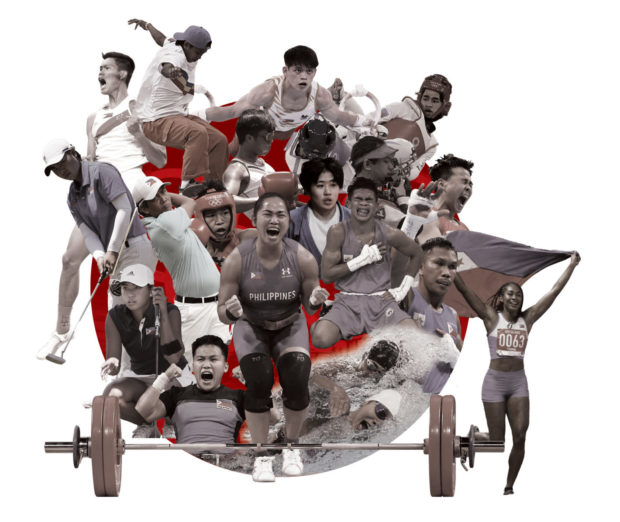
The gallant PH delegation led by Hidilyn Diaz gave this country something to crow about in the time of the pandemic. —INQUIRER FILE PHOTOS
MANILA, Philippines — Anyone surveying the success of Team Philippines in the Tokyo Olympics will easily notice that the athletes who delivered medals for the country were bolstered by teams that helped whip them into formidable contenders here.
But assembling these teams wasn’t cheap.
Philippine Olympic Committee president Abraham “Bambol” Tolentino knows that. And in issuing marching orders for Paris 2024—be as great or do better—Tolentino says he is ready to make the first move.
“I’ll start begging for funds,” he said in Filipino on Sunday.
It doesn’t look like he’ll need to be persuasive to get people to open their wallets. Team Philippines made a valid argument for him.
“[The national delegation] showed the power of the Philippines,” Tolentino said. “In the [Southeast Asian] Games, we won the overall title. Now, we showed we are the best in Southeast Asia.”
In terms of medal quality, the Philippines finished in 50th place with one gold, two silvers and one bronze. The next Southeast Asian country in the field was Indonesia, with a 1-1-3 (gold-silver-bronze) count.
Before the Olympics came to a close with yet another spectacle at Olympic Stadium on Sunday, the United States sneaked past China with a 39-41-33 count. The Chinese, who had led the medal standings all throughout the Games, finished at 38-32-18.
First gold
Hidilyn Diaz won the country’s first gold in nearly a century of participation in the Olympics when she ruled the 55-kilogram category of women’s weightlifting. Her squad, which she calls Team HD, was made up of a coach, a strength and conditioning guru, a psychologist and a nutritionist. The country’s national boxers had the same support — and then some — and came home with two silvers and a bronze.
Diaz’s gold was a narrative-changer for the country. Immediately after she posted two Olympic records to beat previously untouchable Chinese world champion Liao Qiuyun for the gold, Diaz made sure the message wasn’t lost in the din of the celebration.
“This proves we can do it,” she told journalists after her victory at Tokyo International Forum. “They said this was impossible. I thought this was impossible. But the Filipino can do it. We just have to believe.”
And the impact of her win was felt in the finals that Nesthy Petecio (women’s featherweight) and Carlo Paalam (men’s flyweight) fought. There was a tangible belief that the Philippines wasn’t merely hoping to avoid defeat, it was truly gunning for the gold. The two settled for silvers but validated the need for a sustainable program backed by teams.
Those four medals were historic for the country and was welcomed by an avalanche of incentives, bonuses and pledges.
Tolentino wants donors looking forward, too.
“We should expect [financial support] after this performance,” said Tolentino. “In Paris, as long as our programs continue, we should be able to at least match our performance here or better yet, surpass it.”
The Philippine Sports Commission (PSC), which spent P2.7 billion for this Olympic cycle, will bankroll the program’s continuation.
Wise spending
PSC chair William “Butch” Ramirez has said he looks to further rationalize and streamline spending, vowing to put more money in sports where the country can compete for medals in the Olympics.
“It’s the right way to proceed,” Ramirez said.
“We have many athletes who are within striking distance [of Olympic medals] apart from boxing and weightlifting,” Tolentino said. “There’s a lot more.”
He cited gymnast Carlos Yulo, pole vaulter EJ Obiena and golfers Yuka Saso and Bianca Pagdanganan.
But Tolentino also hopes the private sector helps the government in the manner they did for the country’s current Olympians—helping out right from the start of the program.
Tolentino cited the MVP Sports Foundation, which chipped in to bolster Team HD and the national boxing team. Golf has ICTSI pouring millions into the national program. Athletics also has its financial supporters like Ayala Group and CEL Logistics.
Tolentino said funding will be crucial because a bulk of this year’s Olympians are first-timers to the Games and have what it takes to compete in Paris. Only this time, they will carry much-needed experience that will help them in 2024.
Paalam, for instance, said the knockdown that cost him the gold would come in handy as he sets his sights on the French capital.
“That will help me a lot because I had never been knocked down before and now I learned something from it,” Paalam said.
The entire boxing team has picked up a few other lessons as well.
“Where we probably lacked going into the Olympics was possible exposure to our opponents,” Don Abnett, the cerebral boxing coach, said. “Some matches in Europe would have been ideal for us.”
Middleweight Eumir Marcial, who went home with the bronze, wants another run at an Olympic gold. Irish Magno, the only boxer not to win a medal, vowed to continue chasing her dream in Paris, as did Petecio and Paalam.
Yulo is intent in making up for a miss here by “getting better” for Paris.
The talent is ready, but it will take proper funding to whip those athletes—and the others waiting in the wings to get their shot at Olympic glory — into medal shape.
“We’ll find a way,” Tolentino said.


